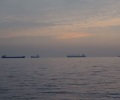Dubai’s premium over Brent widens on expected crude price cuts for Asia

Benchmark Dubai crude futures saw an uptick during midmorning trade in Asia on Wednesday, with the outright contract and intermonth spreads supported by expectations of further price cuts for Asian customers by Middle East crude exporters in the coming days.
At 11 am in Singapore (0300 GMT) Wednesday, the June Dubai futures contract was pegged at $32.31/b, up 1.3% from $31.91/b assessed at 4:30 pm in Singapore (0830 GMT) at the close Tuesday.
Middle East crude benchmark Dubai futures resisted a downward slide in global oil prices overnight as Saudi Arabian official selling price cuts issued to Asian customers solidified the case for other Middle East crude exporters to cut prices as well, said market participants.
This was in contrast to June ICE Brent futures, which slid nearly 5% within the same time frame. The contract, assessed at $31.44/b at Tuesday’s Asian close, was down at $29.97/b by Wednesday morning, widening the European oil benchmark’s discount to Dubai futures.
The June Brent/Dubai Exchange Futures for Swaps spread slid down to minus $2.34/b Wednesday morning in Asia. The spread, which typically pitches the higher quality Brent crude at a premium to medium sour Dubai-linked grades, has spent most of the month in negative territory.
It briefly flipped into a premium at the end of last week, assessed at 41 cents/b on April 9, when optimism surrounding the OPEC+ production cuts deal propelled global oil prices upward. However, the spread slid back down to discounted territory after OPEC+ production cuts at 9.7 million b/d were regarded insufficient to balance the high degree of demand destruction in global oil markets for 2020.
Saudi Aramco cut prices for all five grades to be exported to Asia in May, but did not mete out the same generosity to its European and US customer base.
The kingdom’s May OSPs, the first to be issued among other global crude exporters such as Iraqi SOMO, and Kuwait Petroleum, will likely shape how these producers set prices for their exports to Asia, Europe and the US, respectively.
Crude buyers in Asia are yet to receive OSPs from a host of Middle East producers, even though OSPs have been delayed well past their typical release dates this month.
India lockdown in focus
Meanwhile, an extended lockdown in India played on the minds of market participants in Asia Wednesday morning, damping sentiment for the June cycle further, they told S&P Global Platts.
“India on extended lockdown is awful news for the market, it’s a huge [volume of] demand offline,” said one crude trader.
India extended its countrywide lockdown until May 3 in its battle against the coronavirus pandemic, with Prime Minister Narendra Modi saying the extension was needed to stem the spread of the disease. The initial 21-day lockdown started March 25 and was due to end April 14.
Crude demand in the country is expected to take more of a hit as refineries cut runs and crude throughput figures fall in step with lockdown measures, market participants told Platts.
“We expect India’s crude runs to fall year-on-year by nearly 1.4 million b/d in the second quarter,” said Lim Jit Yang, adviser for oil markets at S&P Global Platts Analytics.
Platts Analytics currently expects India’s oil demand to contract year on year by 405,000 b/d in the second quarter before posting positive growth in the second half of the year, taking the whole year demand decline to 110,000 b/d year on year.
India has restricted cargo movements on coasts, but has allowed oil and gas cargoes, falling under the category of essential commodities, after clearance of COVID-19 quarantine protocol by port authorities.
Upstream companies like ONGC and Cairn have managed to keep their operations running but have witnessed about 10%-15% fall in output due to shortage of workers.
Source: Platts

 Hellenic Shipping News Worldwide Hellenic Shipping News Worldwide, Online Daily Newspaper on Hellenic and International Shipping
Hellenic Shipping News Worldwide Hellenic Shipping News Worldwide, Online Daily Newspaper on Hellenic and International Shipping





















 PG-Software
PG-Software